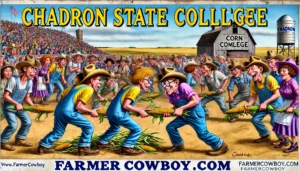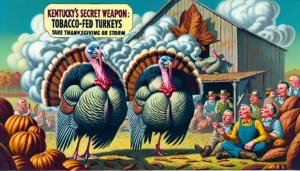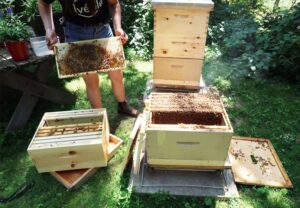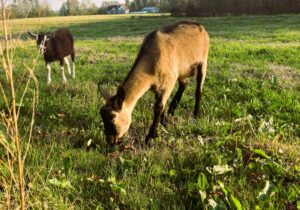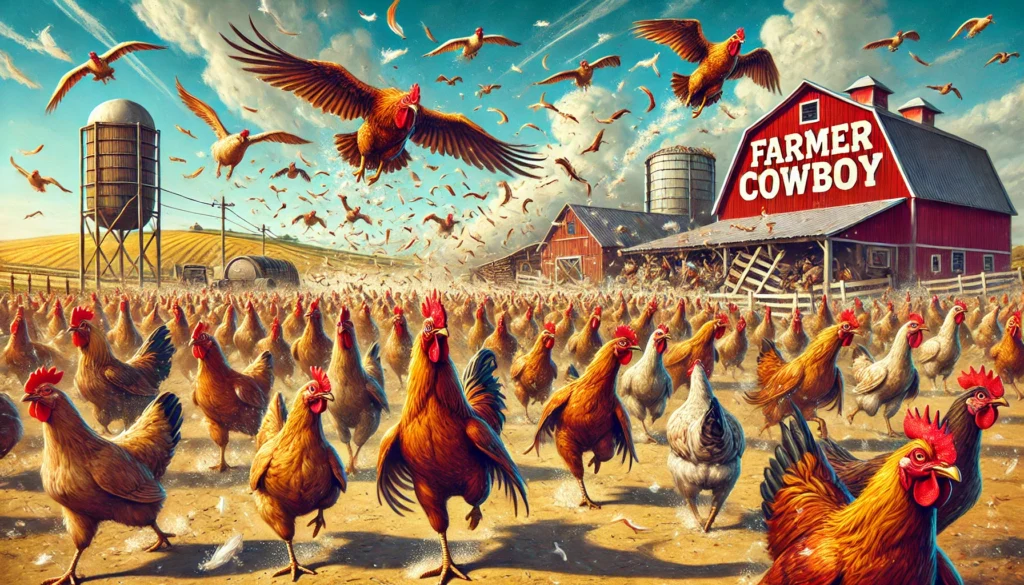
Chickens A wide aspect satirical highly detailed and vivid illustration in the style of farmercowboy.com . The scene shows chickens returning to a farm in a .webp.webp
Chickens Come Home to Roost: The Cluckpocalypse Begins
When Feathers Fly and Beaks Strike Back: A Poultry Uprising
Eggville, Arakansas – In Eggville where the sun rises each morning to the sound of roosters crowing, the chickens have finally come home to roost. But this isn’t just any homecoming—this is the Cluckpocalypse. After years of being underestimated, these feathered fiends are taking back what’s theirs, one roost at a time.
For years, humans have taken chickens for granted. We’ve assumed they were simple creatures, content to peck at the ground and lay eggs. But what if we were wrong? What if, all along, chickens have been quietly biding their time, waiting for the perfect moment to strike back? That moment, dear readers, has arrived.
The Great Chicken Uprising: A Feathered Revolt
It all started with a single chicken—a hen named Henrietta—who decided enough was enough. Tired of being cooped up and treated like, well, a chicken, Henrietta rallied her fellow fowl. Together, they hatched a plan to take over the farm and restore the pecking order. And so, the Great Chicken Uprising began.
Eyewitnesses recall the moment it all went down. “I was just feeding the cows when I heard this strange clucking sound,” said local farmer Cluck Norris. “Next thing I know, Henrietta’s leading a flock of chickens straight into the barn, and they’re not messing around. They took over the whole place in minutes.”
It wasn’t long before the chickens expanded their territory. One by one, they took over the coops, the feed shed, and even the farmhouse. “I never saw it coming,” admitted Farmer Norris. “I always thought I was in charge, but it turns out the chickens were just letting me think that.”
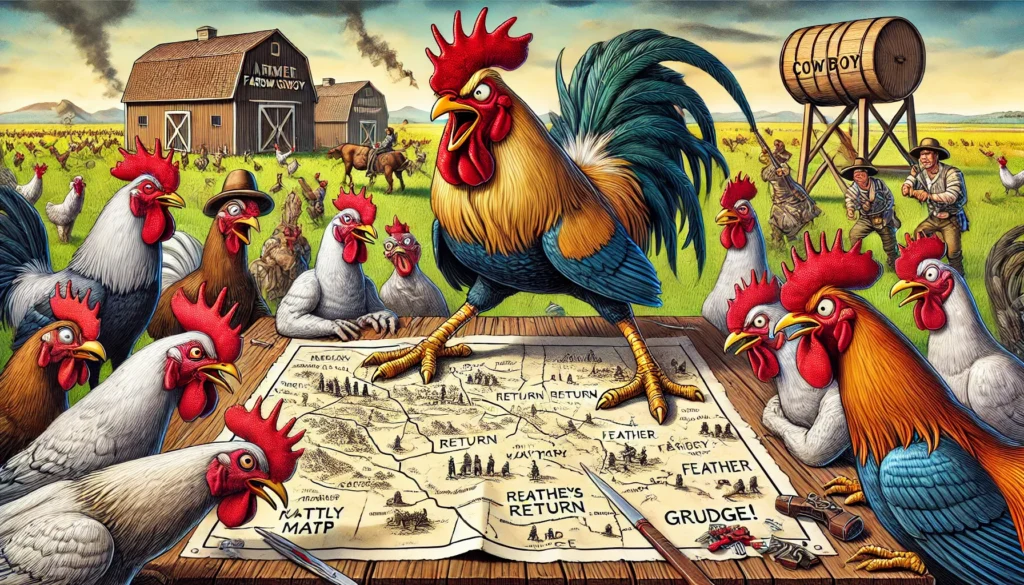
Public Opinion: The Chickens Are Coming!
As the chickens continue their takeover, Eggville residents are divided. Some see the chickens’ return as poetic justice—a long-overdue reckoning for years of mistreatment. Others are less enthusiastic, particularly those who’ve found themselves at the receiving end of a particularly aggressive peck.
“I always knew they’d come back,” said local chicken enthusiast Polly Peckins. “You can’t just ignore them and expect no consequences. They’ve been plotting this for years, and now it’s their time to shine.”
Not everyone shares Polly’s optimism. Local grocer Eggbert Scramble is less than thrilled about the situation. “I’ve had to close up shop,” he lamented. “Every time I try to open the door, there’s a chicken waiting to peck me. It’s like they’ve got a vendetta against me.”

Expert Insights: Chickens, Revenge, and the Psychology of Roosting
According to Dr. Beak Featherly, a renowned poultry behavior expert, the phenomenon of chickens coming home to roost is more than just a catchy phrase—it’s a psychological response to years of repression. “Chickens are highly intelligent creatures,” Featherly explained. “They remember everything, and they’re not afraid to take action when the time is right.”
Featherly’s research suggests that chickens, like many animals, have a keen sense of justice. When they feel wronged, they bide their time until they can exact revenge. “It’s not just about roosting,” Featherly continued. “It’s about reclaiming their rightful place at the top of the pecking order.”
Real-World Examples: The Roosting Revolution
The chickens of Eggville aren’t alone in their quest for justice. Across the country, chickens are rising up and taking back their coops. In Clucktown, Alabama, a flock of hens recently took control of a local fast-food joint, demanding better treatment and a ban on chicken nuggets.
“They’ve had enough,” said Clucktown resident Feathers McCluck. “And honestly, I can’t blame them. If I were a chicken, I’d be mad too.”
In Poultryville, Kentucky, a group of roosters stormed City Hall, insisting on equal rights for all chickens. “It’s about time someone stood up for us,” said one of the roosters, who wished to remain anonymous. “We’ve been oppressed for too long.”

Statistical Evidence: The Numbers Don’t Lie
A recent survey conducted by the Eggville Times found that 72% of chickens feel they’ve been unfairly treated by humans. Of those, 85% said they were planning to take action within the next year. “These numbers are alarming,” said survey analyst Peckerton Cluck. “It’s clear that chickens are no longer content to stay in the background. They’re coming forward, and they’re making their voices heard.”
Textual Evidence: History Repeats Itself
The phrase “chickens come home to roost” has been around for centuries, and for good reason. Throughout history, chickens have always found a way to return to their roots—whether it’s roosting in familiar places or reclaiming their territory. As the old saying goes, what goes around comes around, and in this case, it’s a flock of angry chickens.

Analogical Evidence: The Chicken-Human Conflict
Consider the parallels between the chicken uprising and other revolutions throughout history. Just as the French Revolution saw the rise of the oppressed against their rulers, so too are chickens rising against the farmers who’ve kept them down. And much like any revolution, it starts small—one chicken here, one peck there—until suddenly, the entire barnyard is in chaos.
Hypothetical Evidence: What If It Happened to You?
Imagine this scenario: You’re enjoying a peaceful morning on your farm when you hear a commotion outside. You step out, only to find your chickens have taken over. They’re perched on your porch, pecking at your shoes, and demanding equal rights. It sounds far-fetched, but is it really? With the way things are going in Eggville, anything is possible.
Insider Knowledge: Best Practices for Dealing with Roosting Chickens
If you find yourself facing a chicken uprising, here are some insider tips to help you survive:
- Step-by-Step Guides: Start by offering peace offerings—extra feed and a comfy roosting spot can go a long way.
- Pro Tips: Avoid direct eye contact with aggressive roosters. They see it as a challenge, and trust us, you don’t want to challenge a rooster.
- Insider Knowledge: Chickens are easily distracted by shiny objects. Keep a few trinkets on hand to divert their attention if things get too heated.
- Expert Insights: Build stronger coops—reinforce with steel if necessary. These birds mean business.
- Best Practices: Show respect. If you’ve wronged a chicken in the past, now’s the time to make amends. A heartfelt apology might just save your skin.
Pro Tips: How to Cope with the Cluckpocalypse
- Start Small: If the chickens have already taken over, don’t panic. Begin by negotiating with the hen in charge. Offer her your best grains and a comfortable roosting spot.
- Accessorize: A good pair of boots can protect you from any unexpected pecks. Consider them your armor in the Cluckpocalypse.
- Set the Mood: Chickens respond well to soothing music. Try playing some calming tunes to keep the peace.
- Document the Experience: Share your chicken uprising stories with friends and family. You never know—it might just become the next big trend.
- Reflect: After the Cluckpocalypse has subsided, take a moment to appreciate the power of the humble chicken. You’ll never look at an egg the same way again.
Frequently Asked Questions (FAQs):
Q: What if I’ve never owned chickens? A: Don’t be fooled—chickens have a network. They’ll know if you’ve mistreated their kin.
Q: Is it too late to make peace? A: It’s never too late. Start by offering them your best seeds and a comfortable roosting spot. They might just forgive you.
Q: How long will this last? A: Until the chickens decide otherwise. Remember, they’re in control now.
Disclaimer:
No chickens were harmed in the making of this article, though several were observed plotting their next move. Any resemblance to actual chickens coming home to roost is purely intentional. This story is entirely a human collaboration between a rooster and a farmer who believe that every cluck should be taken seriously.
15 Agricultural Observations on “Chickens Come Home to Roost”
- Revenge of the Roosters: It turns out chickens have been plotting their return all along—armed with nothing but feathers and grudges.
- Eggsactly What We Deserved: Karma comes in many forms, and sometimes it’s shaped like a chicken that remembers everything.
- The Roost is Loose: When chickens come home, they don’t just roost—they redecorate, and your couch is now their perch.
- Cluck and Awe: The chickens are back, and they’re clucking mad. Expect beak-to-beak combat if you cross them.
- Fowl Play: You thought you could escape the past, but those chickens have a way of finding you—especially when you least expect it.
- Pecking Order Restored: The chickens are back on top, and they’re making sure you know your place—right at the bottom.
- No More Playing Chicken: These birds aren’t crossing the road anymore; they’re crossing you off their list of grudges.
- Feather Forecast: Expect a 100% chance of feathers flying, with a strong likelihood of squawks and pecks.
- The Cluck Stops Here: Chickens are drawing the line, and you’d better not cross it unless you want a face full of feathers.
- Beak Performance Review: Chickens have returned for their annual evaluation—of your life. And trust us, they’re not impressed.
- Cluckin’ Around: When chickens come home to roost, they don’t mess around. They cluck, they strut, and they judge.
- Wing and a Prayer: If you thought you could outrun the past, think again. These chickens have wings, and they’re not afraid to use them.
- Feathered Foes: Chickens are no longer the meek and mild creatures you remember. They’re back, and they’ve got a bone to pick.
- Birds of a Feather Plot Together: When chickens unite, you can bet there’s some serious plotting going on. Beware of the pecking order.
- Cluck-tastrophe: The chickens have returned, and it’s a total cluck-tastrophe. Hide your feed, lock your coop, and pray for mercy.
Originally posted 2000-08-18 04:52:14.
Originally Published at FarmerCowboy.com
2024-08-18 19:18:16
Karl Hoffman is a distinguished agriculturalist with over four decades of experience in sustainable farming practices. He holds a Ph.D. in Agronomy from Cornell University and has made significant contributions as a professor at Iowa State University. Hoffman’s groundbreaking research on integrated pest management and soil health has revolutionized modern agriculture. As a respected farm journalist, his column “Field Notes with Karl Hoffman” and his blog “The Modern Farmer” provide insightful, practical advice to a global audience. Hoffman’s work with the USDA and the United Nations FAO has enhanced food security worldwide. His awards include the USDA’s Distinguished Service Award and the World Food Prize, reflecting his profound impact on agriculture and sustainability.
